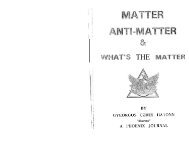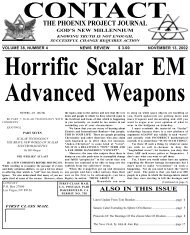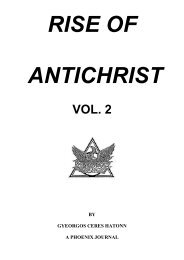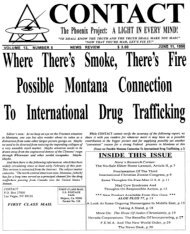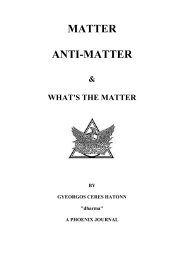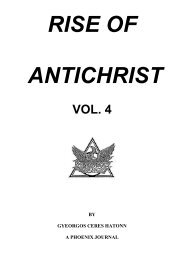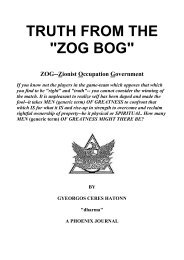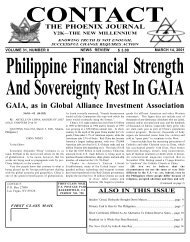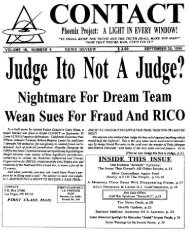CONTACT The Phoenix Project Journal 020306 - Phoenix Source ...
CONTACT The Phoenix Project Journal 020306 - Phoenix Source ...
CONTACT The Phoenix Project Journal 020306 - Phoenix Source ...
Create successful ePaper yourself
Turn your PDF publications into a flip-book with our unique Google optimized e-Paper software.
Page 20 <strong>CONTACT</strong>: THE PHOENIX PROJECT JOURNAL MARCH 6, 2002<br />
In the midst of this constitutional face-off, Waxman<br />
pulled his end run in federal district court in California—<br />
where he may or may not have had standing to bring<br />
such a case. Although on the books for more than 70<br />
years, Section 2954 was little known and had been used<br />
perhaps only three times. Once was in 1994 by then<br />
Rep. William Clinger (R-Pa.), later House Government<br />
Reform Committee chairman, involving a Texas savingsand-loan<br />
case handled by the Federal Deposit Insurance<br />
Corp. <strong>The</strong> agency refused to turn over the documents<br />
until Clinger invoked the 1928 law.<br />
In the Waxman case—which had received no<br />
press attention until this report—the congressman<br />
sought access last April to Commerce Department<br />
“adjusted” 2000 census data and was resisted despite<br />
invoking the Rule of Seven clause. “<strong>The</strong> court win<br />
was a major victory for him,” admits a senior<br />
House Republican lawyer. “But it’s a major<br />
headache for us now.” Why is that? “It’s bad<br />
for business,” says a high-level GOP lawyer in the<br />
House. “It upsets the balance of power in the<br />
House as well as between the branches if it is<br />
allowed to stand.” For one thing it gives a<br />
minority group (meaning a handful of Democrats)<br />
the authority to demand information from the executive<br />
(in this case a Republican-led administration).<br />
“This opens the door to much mischief,” says a<br />
third GOP lawyer who, like the others, didn’t want to<br />
be named. “This is being debated at the highest levels<br />
in the House and above my pay grade,” he tells<br />
INSIGHT, noting that most, including the White House,<br />
hope the case will falter on appeal.<br />
A partisan Waxman ally finds Republican-leadership<br />
angst about this to be ironic given that when<br />
Republicans were in the minority they often complained<br />
about obstacles the majority put in place to block access<br />
to documents, and especially how hard Bill Clinton’s<br />
administration had to fight to withhold information even<br />
from the subsequent GOP majority. “<strong>The</strong> problem is<br />
that they didn’t have the guts to go to court and affirm<br />
this authority, and now they’re pissed we won.”<br />
As for Clinger’s use of the authority in 1994, it<br />
turns out most members of the committee didn’t<br />
know he had used it and neither did the House<br />
Republican leadership, INSIGHT has learned.<br />
<strong>The</strong> Justice Department, some strategists there say,<br />
may simply abandon its fight with Waxman and turn<br />
over the 2000 census data without acknowledging<br />
Section 2954 authority. It then would wait for another<br />
dispute involving a substantially more-sensitive issue that<br />
might be used to strengthen its separation-of-powers<br />
claims. But ultimately, according to everyone on<br />
both sides interviewed by INSIGHT, this issue will<br />
end up in the lap of the high court.<br />
[JR: Rep. Waxman and his minority of seven<br />
Congressmen are the pit bulls challenging the<br />
elephants of power of the Executive branch of<br />
government by using a rarely used statute passed in<br />
1928. This statute was written in vague terms and<br />
is now open to interpretation by everyone and<br />
anyone. Could this old statute be applied to<br />
challenge Bush’s new Executive Order that<br />
empowered him to block access to certain<br />
documents of the Executive branch? Congress<br />
granted the President these powers when they<br />
passed his anti-terrorist bills. Now the question of<br />
the separations of powers is all up for grabs. Place<br />
your bets and let the games begin.]<br />
EXPERTS SEE NO END<br />
TO STRUGGLE WITH BACTERIA IN FOOD<br />
Daily News, 02/20/02<br />
WASHINGTON, D.C.—Dangerous bacteria are<br />
going to be a problem in America’s food for a long time<br />
as new germs arrive in imported products and microbes<br />
already here develop in new forms, scientists say.<br />
In a report for the Institute of Food Technologists, the<br />
scientists also say the increasing use of manure as fertilizer<br />
poses the risk of spreading harmful bacteria to food.<br />
<strong>The</strong> report, being released Wednesday, was prepared by<br />
a team of government and university scientists.<br />
It also warns against the overuse of antibiotics<br />
in livestock, saying there is a “growing body of<br />
evidence” that farm use of antibiotics is causing<br />
bacteria to become resistant to drugs.<br />
<strong>The</strong> scientists say it will be “practically<br />
impossible” to keep hot dogs and similar precooked<br />
meats free of Listeria monocytongenes because the<br />
bacterium is so common.<br />
<strong>The</strong> report does not address the issue of<br />
whether the government’s food-safety agencies<br />
should be consolidated. Food regulation now is<br />
split between the Agriculture Department and Food<br />
and Drug Administration, which have widely<br />
varying inspection programs and rules.<br />
[JR: We have two government agencies, an<br />
Institute of Food Technologists, and a group of<br />
scientists who can’t come up with a solution of<br />
how to protect our food. Why is it that our<br />
scientists can develop bacteria for use in<br />
biological warfare and yet they are unable to<br />
develop friendly bacteria that would neutralize<br />
the effects of harmful bacteria in our food supply?<br />
In this age of modern science there has to be a<br />
“Louis Pasteur” out there in bio-research who is<br />
capable of meeting this challenge? Fame and<br />
fortune would be his or hers plus the honor of<br />
receiving the Nobel Prize award in bio-science.]<br />
MULTI-TRILLION DOLLAR FINANCIAL SCANDAL<br />
By David Podvin, APFN, 02/04/02<br />
“Immediately after business slave George W. Bush<br />
took power, Corporate America went on a lying<br />
spree. Dan Rather, Tom Brokaw and Peter Jennings<br />
appear loath to report that such high profile<br />
companies as Viacom, General Electric, and Disney<br />
are also engaging in the accounting scheme.”<br />
A multi-trillion dollar financial scandal is occurring<br />
in the United States right now. It threatens to inflict<br />
unprecedented carnage upon Corporate America and<br />
horrific damage to our national economy. <strong>The</strong><br />
mainstream media is aware of it, but most Americans<br />
are not, because the corporate news outlets refuse to<br />
report on it. It is not conspiracy. It is complicity.<br />
<strong>The</strong> coverage of the Enron situation has primarily<br />
focused on the disintegration of a powerful<br />
corporation due to the deceit and criminality of those<br />
who ran the company. <strong>The</strong> few reporters who have<br />
looked below the surface have proven linkage<br />
between Enron’s corruption and its political<br />
connections to the Bush administration. While the<br />
crimes of former Enron chairman Kenneth Lay and<br />
the collusion of former Texas governor George W.<br />
Bush are significant, the corporate media is selfishly<br />
choosing not to focus on the big story.<br />
In February of 2001, Enron stock was trading<br />
above $80 per share, which placed a market value<br />
of more than $60 billion on the company. Today,<br />
the stock no longer trades, rendering Enron<br />
virtually worthless. It is crucial to remember that,<br />
despite the harrowing decline in its fortunes, the<br />
company never reported a bad earnings quarter.<br />
Enron’s duplicity is an extreme symptom of a<br />
financial cancer that threatens the health of the<br />
economy. <strong>The</strong> disease is a malignant accounting<br />
method that has received legal protection from<br />
conservative politicians on behalf of their<br />
corporate benefactors. It is called ‘pro forma’.<br />
Originally intended to allow companies to compensate<br />
for extraordinary events that distorted their<br />
financial reports, the pro forma accounting method<br />
has led to the greatest fraud ever perpetrated.<br />
Previously, publicly owned companies had been<br />
legally required to provide shareholders with an<br />
honest accounting of their earnings. <strong>The</strong> standard<br />
used was GAAP, Generally Accepted Accounting<br />
Principles. Under this method, a company would<br />
state its earnings based on the old fashioned equation<br />
of income minus expenses. Using pro forma,<br />
companies decide which expenses are irrelevant,<br />
thereby providing great latitude for creativity.<br />
Freed from concerns about regulatory oversight,<br />
this country’s biggest companies became dramatically<br />
more ‘creative’ with their earnings reports.<br />
Current estimates for S&P 500 corporations are<br />
that they have collectively earned about $410<br />
billion in 2001 when using the pro forma<br />
accounting method. However, when using GAAP,<br />
they have collectively earned about $240 billion.<br />
Those who claim that Enron was an<br />
exceptional case are technically correct. While<br />
Enron overestimated its earnings by 100%, the<br />
average large publicly held American corporation is<br />
overestimating its earnings by only 42%.<br />
IBM reports pro forma earnings. So does Intel.<br />
And Cisco Systems. And Dell. And Sun Micro. And<br />
Motorola. And Microsoft. And... By engaging in<br />
such manipulation, with the assent of accountants and<br />
governmental oversight agencies, Corporate<br />
America has conned the public into investing<br />
trillions of dollars based on phony earnings.<br />
Cisco, for example, has used its artificially inflated<br />
stock price as capital to acquire other companies.<br />
Many corporate empires have been built on such<br />
accounting legerdemain, including General Electric<br />
(NBC), Viacom (CBS), Disney (ABC), AOL/Time<br />
Warner (CNN, Time Magazine), News Corporation<br />
(Fox), <strong>The</strong> Washington Post Company (Washington Post,<br />
Newsweek), the Tribune Corporation (Chicago Tribune,<br />
Los Angeles Times), and the New York Times Company<br />
(New York Times, Boston Globe).<br />
Enron is the tip of an iceberg on which sits the<br />
entire mainstream media. A national association of<br />
accounting firms has called on the Securities and<br />
Exchange Commission to require all publicly held<br />
corporations to report real GAAP earnings. <strong>The</strong><br />
return to ethical accounting standards would mean<br />
that, in order to reflect the current valuation of<br />
the Dow Industrials, the average would fall to<br />
5825. In order to reach the historical norm based on<br />
GAAP, the Dow would decline to 3300.



